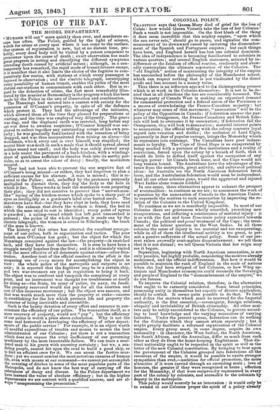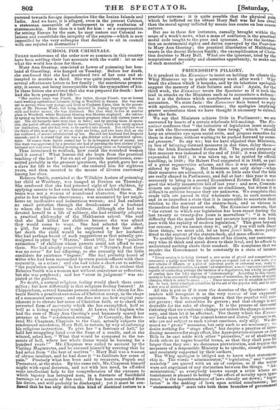COLONIAL POLICY.
TRADITION says that Queas,Mary died of grief for the loss of. Calais : bow would Queen Victoria take the loss of her Colonies? Such a result is not impossible. On the first blush of the thing it does seem incredible that this mighty empire, "upon which the sun never sets," should go to pieces, and signalize the com- mencement of its downward career by imitating the dismember- ment of the Spanish and Portuguese empires ; but such things have been, and England herself has lost one colonial dominion. The idea of independence is becoming familiarized to colonists in various quarters; and several English statesmen, actuated by in- difference or the fatalism of official routine, studiously and avow- edly contemplate the ultimate separation of the Colonies. The "old English" notion of maintaining the integrity of the empire has succumbed before the philosophy of the Manchester school, which can respect nothing that is not vindicated by the direct profit and loss account in a money value. Thus there is no influence opposed to the disintegrating process which is at work in the Colonies themselves. It is not to be de- nied that in all directions the ties are considerably loosened. The Orange party of Canada West is making an organized demand for commercial protection and a federal union of the Provinces as a means of overwhelming the Franco-Canadian majority : but whatever may come of that movement, "annexation' will be the policy of the Opposition in Canada: if federation answer the pur- pose of the Orangemen, the Franco-Canadians and British Libe- rals will look to overcome it by annexation; if federation fail the Orangemen, they will look to annexation ; material interest points to annexation ; the official trifling with the colony converts loyal regard into vexation and dislike ; the seclusion of Lord Elgin, apparently in fear of popular outrage, brings the Monarchy which he represents into contempt. The Canadians have poor induce- ments to loyalty. The Cape of Good Hope is so exasperated by being mocked with a pretence of free institutions and a reality of convictism, forced upon the colony by a breach of faith, that it would do little to defend itself against the occupation of any foreign power : let Canada break loose, and the Cape would not long remain bound. The Australians have the advantages of dis- tance from the metropolis, great activity, and cultivated political ideas : let Australia see the North American federation break loose, and the Australasian federation would soon be independent. And all our other colonies „aine, would the aggrieved and injured West Indies alone remain faithful ?
In one sense, three alternatives appear to exhaust the prospect of eventualities : to continue as we are ; to commence the work of separation by the annexation of Canada to the American Union ; to supersede the motives to such annexation by improving the re- lation of the Colonies to the United Kingdom. To continue as we are is manifestly impossible. In most of our Colonies there are grievances wholly unsettled, provoking new exasperations, and inflicting a continuance of material injury : it is so with the fast and loose Free-trade policy exercised towards Canada ; the political and penal treatment of the Cape ; the treat- ment of the labour question in the West Indies. In all those colonies the sense of injury is too material and too exasperating, while in all of them the intellectual activity is too great, to per- mit a passive sufferance of the actual policy. Some of our pre- sent rulers avowedly contemplate dismemberment : we tell them that it is not distant ; we tell Queen Victoria that her reign may see it begun.
Separation, beginning with North American annexation, is not only possible, but highly probable, considering the motives already mentioned, and the official indifferentism. But how it would be possible to maintain the rank of England in the scale of nations when she had been stripped of her Colonies, or how Whig op- timists and Manchester economists could reconcile the Sovereign and people of England to the " dismemberment of the empire," we do not foresee.
To improve the Colonial relation, therefore, is the alternative that ought to be earnestly considered. Some broad principles, possessing unity in themselves but capable of diverse application, should be settled. It seems quite possible to do that. To limit and define the matters which must be reserved for the Imperial authority, is the first essential,—sovereignty, foreign relations, ubiquity and inviolability of British citizenship. All other mat- ters may be safely surrendered to the Colonies, to govern accord- ing to local knowledge and the varying necessities of varying latitudes. Under the present system, federation can do nothing for the Colonies which they cannot attain separately ; but it might greatly facilitate a reformed organization of the Colonial empire. Every group must, in some degree, acquire its own nationality : in character, the West Indian, the North American, the South African, and the Australian, differ as much from each other as they do from the home-keeping Englishman. That dis- tinct nationality ought to be'respected in the spirit as well as the letter of the new Colonial constitution. By bringing to bear upon the government of the Colonies grouped into federations all the resources of the empire, it would be possible to excite stronger sympathies than ever,—ambition for official promotion, the more attractive if it were carried through an ascending scale ; love of honours, the greater if they were recognized at home ; affection for the Monarchy, if that were reciprocally represented in every part of the colony by colonists, and accessible to the colonists by deputy in the metropolis.
This policy would scarcely be an innovation : it would only be to extend to our Colonies proper the spirit of a policy already
pursued towards foreign dependencies like the Ionian Islands and India. And we have, it is alleged, even in the present Cabinet, a statesman susceptible of development to any exaltation of statesmanship. Here then is a task for him : as a compensation for setting Europe by the ears, he may restore our Colonial re- lations and consolidate the integrity of the empire—which is now imperilled by the very colleague that declined to sit in council with one reputed so destructive !



























 Previous page
Previous page